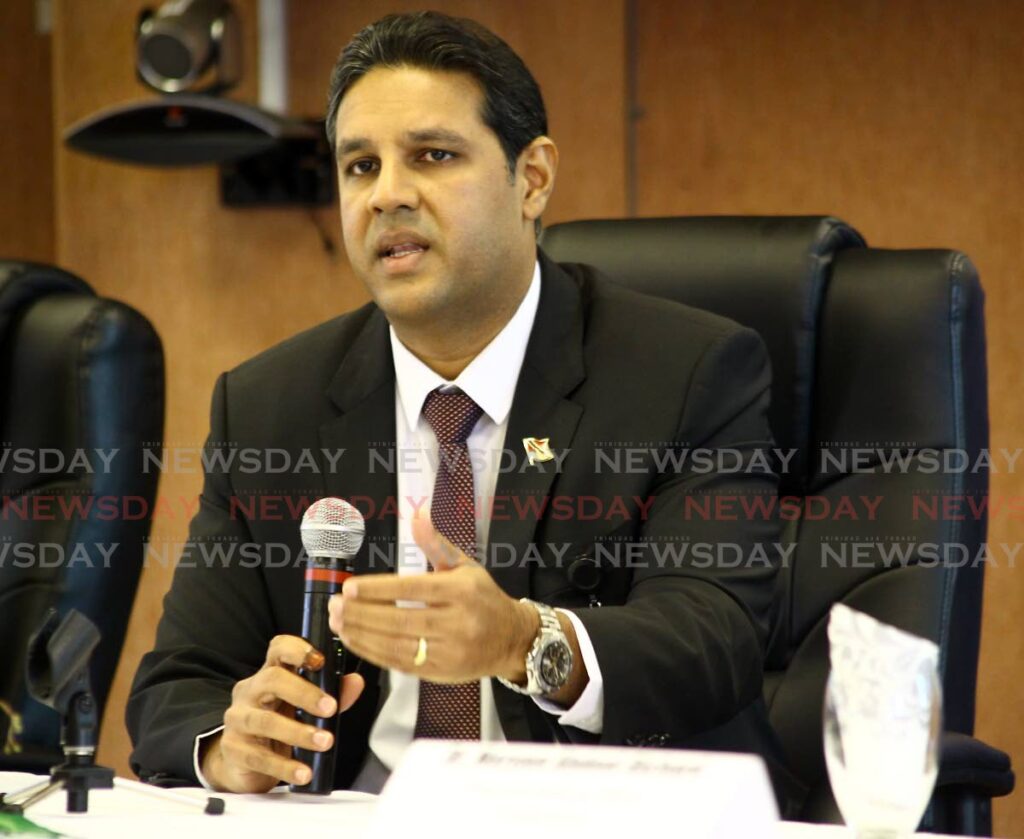CMO, Dr Hinds: Early signs of omicron spread in Trinidad and Tobago

TRINIDAD and Tobago must be ready for a surge of the omicron covid19 variant, which may be in the embryonic stages of local or community spread.
Among those most vulnerable to omicron are children. There are currently four covid19 paediatric cases in the parallel health-care system established in 2020 to deal with the virus. While there have been reports of the possible emergence of a new covid19 variant, deltacron, available data does not suggest it is a variant of concern such as the delta and omicron variants.
Chief Medical Officer Dr Roshan Parasram, epidemiologist Dr Avery Hinds and emergency care specialist Dr Joanne Paul made these comments at the virtual health news conference on Monday.
In analysing recent epidemiological data from the final two weeks in December, Hinds said this information is being examined "against the backdrop of potential community introduction of the far more transmissible omicron variant."
He added, "We continue to need to be on our guard."
Referring to the latest weekly report he received from UWI's Medical Sciences Faculty, he said, "We would have done 29 additional samples. Five of those would have shown up to be omicron and the rest of them, 24, would have been delta."
Against that background, 17.24 per cent of the covid19 samples are omicron and the rest are delta.
"We are still seeing a predominance of delta in the sampling."
When people experience milder symptoms in any disease, Parasram said those people might not come forward for testing and could be covid19-positive.
"It is very hard to tell at this point, but we may certainly have local cases." He recalled that four out of the 17 omicron cases in TT are local while the others had travel-related histories.
"So we are looking at early community or local spread for sure and it will only be a matter of time before we get what has happened in the other countries (with omicron)." Parasram said the ministry estimated there could be an increase in covid19 cases within one-two weeks.
"We are waiting to see that increase, at least coming out of the samples."
Between December 27 and January 2, there was a 71 per cent increase in covid19 cases worldwide. or 9.5 million new cases. The Americas, South-East Asia, Europe. Eastern Mediterranean, African and Western Pacific regions, saw the highest number of cases in this period. In terms of countries with increased covid19 cases in this period, the United States and the United Kingdom saw 92 and 51 per cent increases in cases respectively.
The large number of covid19 mutations allows the virus to stick to human cells more easily. Referring to a recent bulletin from the World Health Organization (WHO), Parasram said,"'Unlike delta and other variants, omicron seems to be replicating in the upper respiratory tract and not the lower respiratory tract."
The upper respiratory tract refers to the nose, throat and other organs above the lungs.
"While the omicron appears to be less severe than delta, especially in those (people) who are vaccinated, it does not mean that it should be categorised by any means as mild."
Parsaram said omicron still causes severe illness, hospitalisation, overburdens health-care systems globally and the world recorded omicron deaths a few weeks ago. He reiterated that fever, chills and shortness of breath are amongst the symptoms experienced by covid19-positive people.
Paul said unvaccinated people are showing more severe covid19 symptoms. Referring to conversations about omicron trends she had with colleagues in the US, UK and India, Paul said unvaccinated people show more severe symptoms than vaccinated people and trends in other countries may be similar or different to what is happening in TT.
Factors such as level of covid19 vaccination and health of the population could influence covid19 trends in a country. Paul said the families of health care workers have to be extra vigilant "to maintain their public-health measures at the home."
This includes things like maximising family time outdoors, with proper physical distancing.
"You are trying to protect that health care worker to be able to go to work and take care of us."


Comments
"CMO, Dr Hinds: Early signs of omicron spread in Trinidad and Tobago"